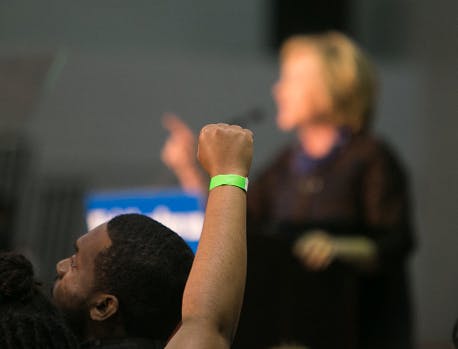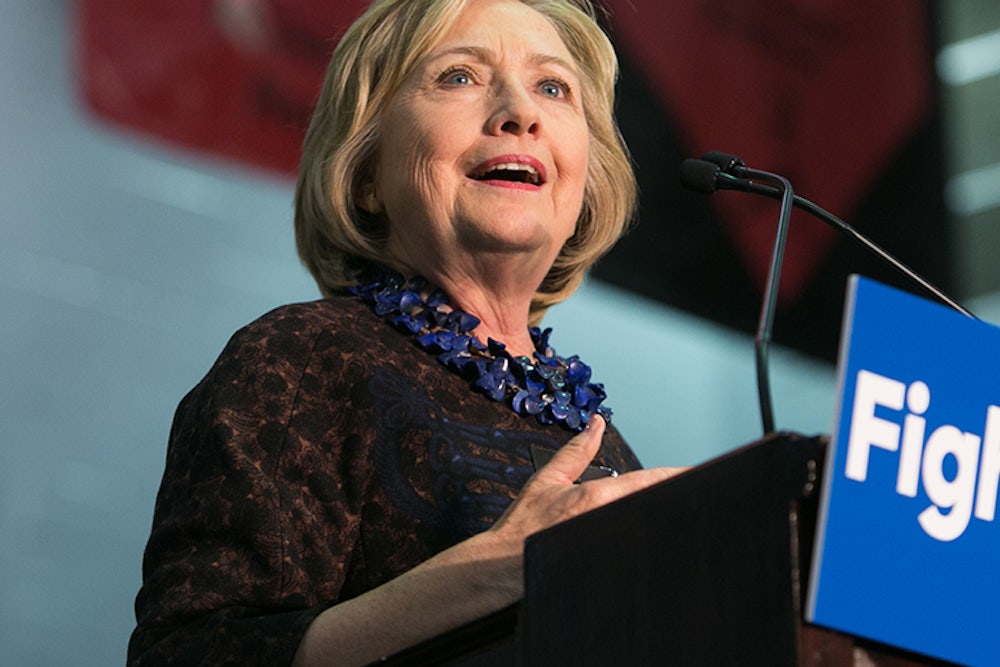America has a rather cavalier attitude towards the bodies its law enforcement throws away, whether into prisons or graves. And it is oddly selective, choosing to introduce some of its citizens to a structurally unjust criminal justice system, while largely lionizing and exonerating those sworn to protect and serve. We need look no further than the brutal symbolism, captured on video, of a black high school student in South Carolina being violently torn from her high school classroom desk by a white school cop this week. As forcefully as she was thrown by now-former officer Ben Fields, the girl was quite literally flipped into a criminal justice system that wasn’t built to protect her. It was the school-to-prison pipeline made manifest.
This is the America that Hillary Clinton sought to address and presumably ameliorate when she took a stage in Atlanta on Friday in front of a legion of students from local historically black universities. After facing protesters who chanted and sang the Janelle Monae anthem "Hell You Talmbout" over the first part of her speech, the former secretary of state eventually advocated for a number of key racial justice reforms: A long-overdue overhaul of drug sentencing laws, legislation to prohibit racial profiling, and “banning the box,” a federal ban on employers asking applicants about their criminal history—a proven barrier to readjustment after prison. She also came out against the private sector's encroachment of the prison system. "We need to end private prisons and detention centers once and for all," Clinton said. "Protecting public safety is the core responsibility of the government, and it should never be outsourced."
Even with the #Hillary4Who action at her event, it was likely a relief to many to see the Democratic presidential frontrunner finally articulating her formal platform to address and end structural racism. She was there, after all, because she has been pushed by Black Lives Matter and other citizens demanding to know her plans. But she was also there because we’re still trying to fix Ronald Reagan’s mistakes.
Drafted in a haste after the sudden overdose death of NBA draftee Len Bias, the Anti-Drug Abuse Act of 1986 established, among other harsh penalties for drug offenses, the 100-to-1 cocaine disparity. Essentially, you’d get the same time for possessing five grams of crack cocaine as you would for 500 grams of the powdered version of the same drug. While President Obama sought to reduce the disparity to 1-to-1 in his Fair Sentencing Act five years ago, Republicans forced a compromise of 18-to-1. Even with the U.S. Sentencing Commission making retroactive reductions for inmates convicted under the old ratio—thousands of whom were released on Friday—Clinton made clear in her address that the adjusted disparity still reflects bad assumptions about the drug.
Carl Hart, a Columbia psychology and psychiatry professor who studies the effects of drugs on the body and behavior, agreed. In remarks sent to the New Republic prior to the speech, Hart offered a scientific explanation for why crack and powder cocaine are the same thing, and should be treated as such by the legal system. “It is true that the effects of smoking crack cocaine tend to be more intense than swallowing or snorting powder cocaine—but that increased intensity is due to route of administration, not the drug itself,” he wrote. “Injecting powder cocaine dissolved in water produces nearly identical intense effects as smoking crack.”
The societal effects of the drug disparity are perhaps even more vivid. The Anti-Drug Abuse Act became, in effect, the Incarcerate African Americans Act. In a 1997 report, the Sentencing Commission reported that more than 88 percent of all crack convicts were black. In that respect, though, Clinton also has her own legacy to contend with. More so than any other Democratic presidential frontrunner in generations, she is in a fight for the black vote, mostly thanks to her own past support of the 1994 law that her husband, Bill Clinton, signed to rein in violent crime. The former first lady defended that legacy—or, at least equivocated about it—in her first face-to-face meeting with Black Lives Matter activists in August.
The Reagan and Clinton administration laws—drawn up during a panic over crime rates and drug abuse—are still being used to send first-time offenders away to rot. But where once discussion about the disproportionality of sentences handed out to black defendants convicted of nonviolent drug crimes was primarily in the province of academics, lawyers, and activists fighting to reverse these biased policies, it’s nice to see that the topic has become a presidential campaign issue.
“The entire conversation around criminal justice reform is substantially different from what we've seen before,” said Nicole Porter of The Sentencing Project. “The talk has always been tough on crime instead of smart on crime, so it's encouraging that you have leading candidates acknowledging the need to revisit the nation's harsh policies and address mass incarceration.”

To that end, Clinton’s second proposal was perhaps more to the point, seeking to interrupt the casual introduction of people to the justice system just because of how they look. Once a co-sponsor of the End Racial Profiling Act during her days as a U.S. senator, Clinton on Friday pushed for legislation to end racial profiling, stating, truthfully, that it actually makes law enforcement less effective. She underscored the psychological impact of the practice on marginalized communities in her remarks. “It is wrong, it is demeaning, and it does not help keep us safe or solve crimes," Clinton said in her speech. "It’s time to put that behind us."
Racial profiling is certainly institutionalized and even formally codified within many law enforcement agencies, but it is inherently subjective. The notion that profiling can be eliminated by something a president signs may sound quaint, but it’s a step for which Democrats in Congress have been fighting for years. In April, two Democrats introduced a new version that would create a federal prohibition on profiling by race, gender, religion, sexual orientation and identification, and more.
Lastly, her proposal to “ban the box” is an essential part of any serious criminal justice reform package. Per a report by CNN’s Tanzina Vega this week, a recent survey by the Ella Baker Center for Human Rights found that 76 percent of former inmates said finding work after being released was difficult or nearly impossible. The stink of criminalization extends beyond the prison walls, and it’s even worse when you’re black. Vega also cited research that showed that white job applicants are more likely than blacks to get a response from an employer, regardless of whether the white applicant has a criminal history. That isn’t being selective. That’s just what discrimination looks like, and it’s a path back to prison.
Even though it comes weeks after her fellow Democratic candidates released their own proposals, it was meaningful to both see Clinton launch her platform and see protesters continue to push her further. Both, in their own ways, made it clear how much work still needs to be done. The scene in Atlanta was resonant coming in a week in which we saw the South Carolina high school incident transpire. Yes, the officer was fired. But while he hasn’t been charged with assault or any other crime, the girl, recently placed in foster care, is still facing a misdemeanor along with the recovery from her injuries—thanks to South Carolina’s “disturbing school” law. The inherent criminality too many Americans believe she was born with was reinforced formally, despite the officer’s assault upon her. (Add to that the blame heaped upon her by the sheriff for initiating an incident in which she was brutalized.)
It is encouraging to see Clinton offer her support behind policies that help erode these kinds of barriers that keep so many from experiencing what amounts to full American citizenship, and to remind our white neighbors that they need to play their part in the struggle. "I know very well for many white Americans, it is tempting to close our eyes to the truth, to believe that bigotry is largely behind us, that institutionalized racism no longer exists," she said in her remarks. "But as you know so well, despite our best efforts and our highest hopes, America's long struggle with race is far from finished." It's a smart approach. And notably, the ideas she's backing—even if she were president already, we could only really call them ideas at this stage—have the potential to change millions of black lives. That matters. It's also good that Clinton put the spotlight on Republicans as the consistent backers of the racial status quo.
However, we also have to take into account what she didn't bring up today: her continued, albeit limited, support of capital punishment, which has a well-documented racial bias. Bernie Sanders and Martin O'Malley both support the end of the death penalty, and rightfully so. Clinton should reverse course on this issue, and tone up her language when referring to that 1994 crime law, if she hopes to be given full credibility on these issues. A racial justice platform that omits a call for the end of the death penalty isn't a complete racial justice platform, and Clinton needs to grasp that right quick. Citizens of every stripe need to push her on this, and, as she rolls out the rest of her proposals, any other weak spots.
Structural racism has so many roots in our ground. As such, it must be attacked with a piecemeal strategy. But that strategy can't afford to be incomplete.
